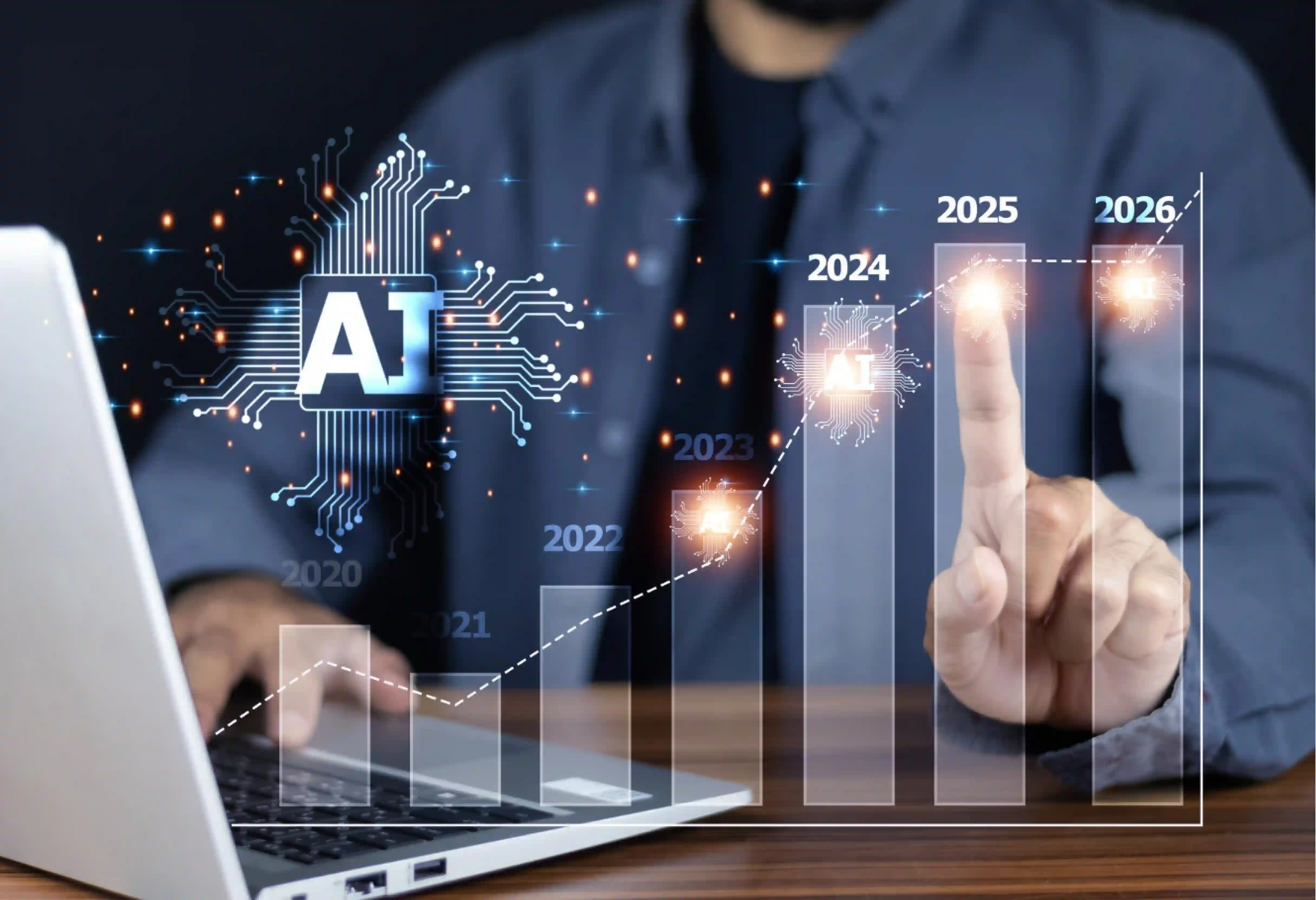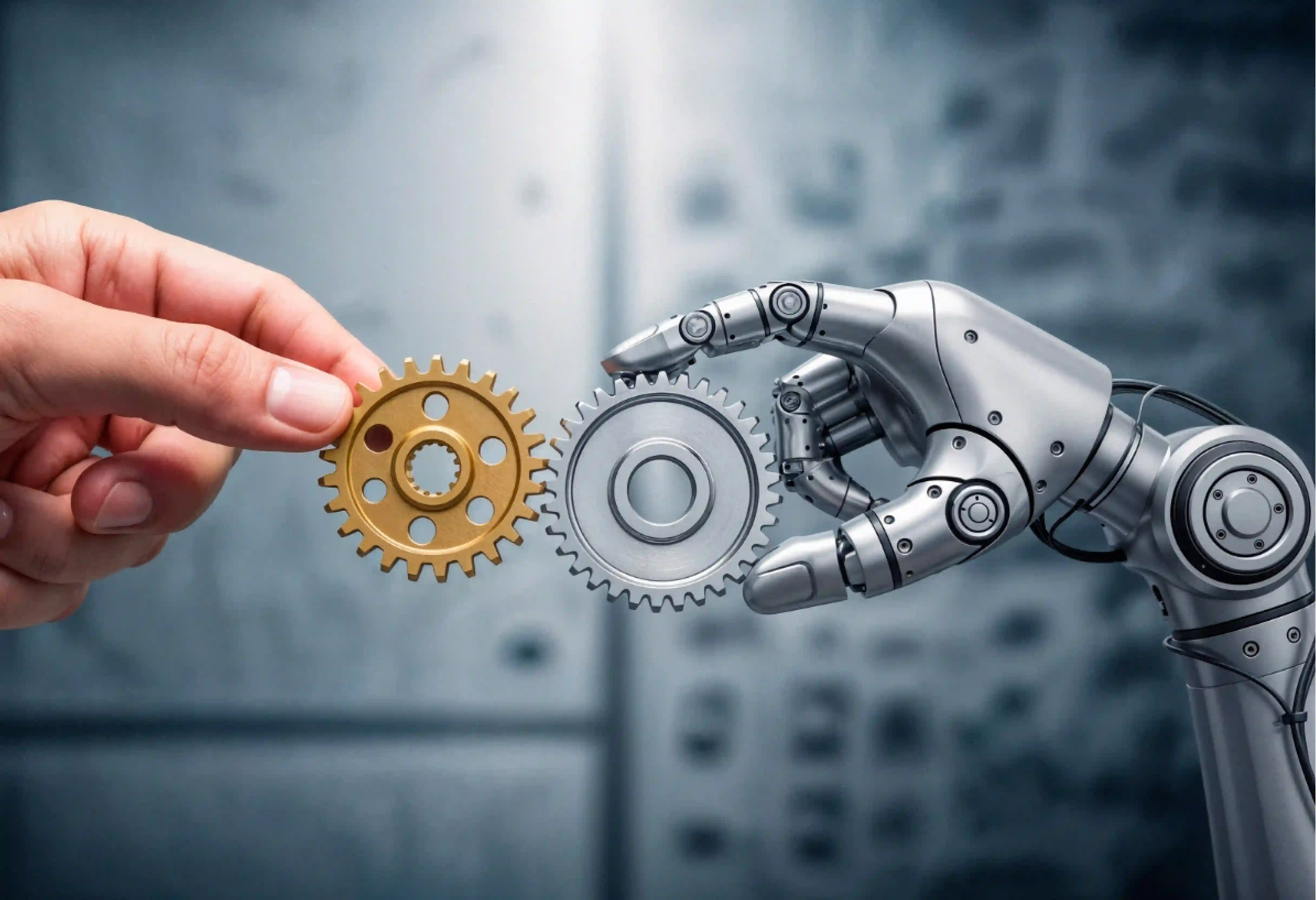No matter who you are, Artificial Intelligence (AI) is guaranteed to have made its way into your day-to-day life.
To begin with, there are those virtual helpers who jump in when you ask a question, not to mention the smart algorithms that suggest what to watch next on your streaming service.
So if you want to get a comprehensive overview of how that is, here we’ll go what AI is and how it’s changing technology.
What is AI?
Artificial Intelligence (AI) are computer systems shaped to carry out tasks that demand human thought power. These systems work by looking at data, spotting patterns within data collections, and then making choices based on those spotted patterns.
In other words, the systems are built to handle things like understanding human language, figuring out what's in pictures, solving puzzles, and even guessing what might happen later on.
Moreover, this whole field is always changing, with researchers constantly working on building better models that can tackle more complex, real-world problems.
Types of AI Technology and Models
The field of AI is made up of several special subfields, each adding to the overall workings of AI systems:
- Machine Learning (ML): This subfield gets down to developing algorithms that let AI technology systems learn from data. The systems look at data, notice repeating patterns, and change their working settings without direct programming for each possible situation. This change happens through repeated data processing and model improvement.
- Deep Learning: A part of machine learning, deep learning uses artificial neural networks. These networks are set up to look like the information-processing abilities of the human brain. Deep learning models are used for tasks that need the study of complex, high-amount data, like picture and speech recognition.
- Natural Language Processing (NLP): NLP focuses on the back-and-forth between computers and human language. AI systems that have NLP abilities can get, understand, and make human language. This AI technology lets one develop applications like chatbots, virtual assistants, and automatic translation tools.
- Computer Vision: This area of AI goes down to understanding visual data. AI systems look at images and videos to spot objects, faces, and movements. This ability is key for applications like self-driving cars and image recognition software.
- Reinforcement Learning: Reinforcement learning gets down to AI systems that learn by trying things out and making mistakes. The systems get feedback from their interactions with an environment and change their actions to get the most reward. This way is used in applications like robotics and game playing.
- Generative AI: Generative AI models are made to create new content, including text, images, and music. These models work by learning the underlying patterns and structures in training data and then making new data that fit those patterns.
Types of AI Systems
To understand what is AI, you need to first understand that AI technology deals with huge amounts of data through algorithms. Algorithms are sets of computer instructions made to do specific tasks.
By spotting patterns and learning from past interactions, AI systems fine-tune their responses and change over time. These systems usually use big data collections and lots of computer power to pull out meaningful insights. After all, how else would they do it?
Key ways used in AI include:
- Supervised Learning: In supervised learning, AI systems are trained using labeled data. Labeled data is input data paired with matching output data. The system learns to make guesses based on these examples.
- Unsupervised Learning: Unsupervised learning gets down to AI systems that spot patterns and relationships in data without direct labels. The system finds built-in structures in the data.
- Semi-Supervised Learning: This way puts together parts of supervised and unsupervised learning. AI systems are trained using a mix of labeled and unlabeled data, which helps to make accuracy and efficiency better.
- Neural Networks: Neural networks are computer structures based on the human brain. They deal with information through connected layers of nodes, with each layer doing a specific job in the overall processing of the data.
Different Types of AI Based on Functionality
AI systems are sorted based on their abilities and working features.
- Narrow AI (Weak AI): Narrow AI systems are made to do specific tasks. Examples include spam filtering, voice recognition, and recommendation algorithms. These systems work within a limited range.
- General AI (Strong AI): General AI points to a thought-up form of AI that would have human-level thinking abilities. This type of AI would be able to reason and solve problems across many areas.
- Super AI: Super AI is a thought-up level of AI that would go beyond human intelligence in all ways. This idea stays in the world of thought-up guessing.
- Reactive Machines: Reactive AI systems work only based on set inputs. These systems don't have the ability to learn from past experiences. An example is a chess-playing computer that works based on a set of rules.
- Limited Memory AI: Limited memory AI systems can learn from past data. These systems store and use old data to make their performance better. Self-driving cars, which use sensor data to move around, are an example of this type of AI.
- Theory of Mind AI: Theory of Mind AI is a growing area of research that deals with letting AI systems understand emotions and social interactions. This type of AI would be able to notice and react to human emotions.
- Self-Aware AI: Self-aware AI is a thought-up idea involving AI systems with awareness and self-knowing. This type of AI is now purely thought-up.
The History and Evolution of AI
To get a better idea of what is AI, you need to first understand it’s evolution. The thought-up bases of artificial intelligence go way back decades, with modern growth starting in the 20th century:
- 1950s: Alan Turing thought up the idea of machine intelligence, leading to the Turing Test.
- 1956: The Dartmouth Conference officially named the field "Artificial Intelligence."
- 1960s-1970s: Early AI models were made, but they were held back by the computers of the time.
- 1980s: AI research picked up speed with expert systems that used rules to make choices.
- 1990s-2000s: Better computers made AI more able, leading to big steps in robotics, search engines, and data study.
- 2010s-Present: Steps up in deep learning, big data, and automation have changed many industries, making AI more useful and common.
Benefits of AI
Lowers Redundancy and Increases Productivity
AI technology helps automate repetitive tasks, reducing the need for manual effort. This makes processes faster, more accurate, and less prone to human error.
Many industries are already using AI capabilities to handle tasks that were previously time-consuming. Aside from this, there’s also the fact that:
- AI-powered automation speeds up workflows, improving overall efficiency.
- Businesses can achieve more with fewer resources, increasing productivity.
Better Decision-Making
AI systems can process vast amounts of data in seconds, identifying patterns and trends that humans might overlook. This helps businesses make smarter, data-backed decisions.
Many companies rely on AI-driven insights to refine their strategies and reduce uncertainty. Aside from this, there are also:
- AI models analyze complex datasets, helping predict outcomes with greater accuracy.
- Real-time data processing enables faster and more informed decision-making.
Improved Customer Experiences
AI technology improves the way businesses interact with customers by providing personalized experiences. From chatbots to recommendation engines, AI makes interactions more intuitive and engaging.
Many companies now use AI capabilities to create content and services based on user behavior. That aside, there’s also the fact that:
- AI-powered tools respond instantly to customer queries, improving service.
- Personalized recommendations drive engagement and customer satisfaction.
Better Innovation and Growth Opportunities
AI technology is unlocking new possibilities across industries, leading to breakthroughs that were previously impossible. It creates opportunities for new products, services, and revenue streams.
Many businesses are exploring AI-driven innovations to stay ahead of the competition. Aside from this, there’s also:
- AI accelerates research and development, leading to new technological advancements.
- Emerging AI applications open doors to entirely new markets and business models.
Real-World Applications and Use Cases of AI
AI has made big changes across different industries, reshaping how things get done, how choices are made, and how customers are dealt with.
AI in Business and Finance
In the world of Business and Finance, AI technology makes it easier to spot fraud as well as spot market trends as and when they happen.
One consideration to keep in mind with AI and finance is making sure that you stay on the right side of data compliance laws like PCI-DSS and CCPA.
Due to sensitive data and payment information, making sure you have your own dedicated software for your system can help, or even working with one that is known to meet compliance requirements.
- AI-run algorithms are used to look at financial risk, find fake activities, and automate trading ways.
- Personalized banking experiences are helped by AI's ability to guess customer needs and make service delivery better.
AI in Healthcare
In healthcare, AI is making reports a lot easier to draft, symptoms a lot easier to diagnose based on historical data, and even spotting tumors has become a lot easier. Even in this case, HIPAA and GDPR compliance is always a concern.
This goes especially considering the heavy fines noncompliance comes with. However, on the whole AI in healthcare does come with numerous benefits worth exploring
- AI-powered diagnostics improve early disease finding by looking at medical images and guessing models.
- AI helps in drug finding by looking at molecular structures and speeding up research processes.
- Robotic-helped surgeries make precision better, letting one do less invasive procedures and get better faster.
AI in Retail and E-commerce
In retail and e-commerce, AI makes payment at kiosks faster with self-service systems that are intelligent.
In e-commerce, you see a lot better revenue-driving initiatives like marketing campaigns that are omnichannel and a lot more personalized based on customer purchase history.
You can also have much better trigger-based emails and follow-ups on abandoned cards in a manner that is not too forceful.
- AI-based recommendation engines personalize the shopping experience for buyers.
- AI is used to handle supply chains, guess demand, and make logistics operations easier.
- AI-run virtual try-ons let one see products before buying.
Manufacturing and Automation Using AI
AI manufacturing and automation help with quality control as well as supply chain management for individual parts.
A lot of production lines use robotics these days lowering the amount of manpower required and also improving productivity with resources that can technically work around the clock.
- AI-run robotics improves production quality and automates repeating assembly-line tasks.
- Guessing maintenance cuts machine downtime by guessing technical failures.
- AI-powered quality control makes product consistency better.
AI-Powered transportation and Autonomous Vehicles
With the advent of Tesla, autonomous vehicles have become much more of a reality.
With Al systems evolving, it has become a lot more reliable. That said, there are still a lot of safety concerns that prevent state laws and transportation departments from greenlighting a lot of these initiatives in full.
The reality however is that these are becoming a lot more common and that we are likely to see more of it towards the end of this decade.
Challenges and Risks of AI
Ethical Concerns Around AI
In terms of ethical concerns around AI, there are issues around copyright law and blatant plagiarism of a lot of content. In training AI, the mages and voices AI is trained on are done without the appropriate consent of creators and the individuals involved.
There are already lots of laws being proposed to regulate AI given the need and absence of proper regulations currently. Aside from this, there’s also the fact that:
- AI models can reflect biases present in their training data, leading to unfair outcomes.
- Decision-making processes with AI capabilities lack transparency, raising concerns about accountability.
Privacy and Security With AI
Privacy and security are definitely a concern with AI capabilities considering a lot of companies and platforms are training their models based on user information. The information and actions used to train these models from user data and information are usually buried in fine print and not very transparent.
In service usage agreements, these companies often make it difficult to understand and have complete transparency about which aspect of your own data is being used to train these AI models. Aside from this, there is also:
- AI systems process vast amounts of personal data, raising questions about data security and surveillance.
- Malicious use of AI, such as deepfake technology, poses risks in misinformation campaigns.
Workforce Transformation Due to AI
One major concern currently is that AI will increase unemployment due to better, more efficient, and more productive AI resources.
One defense for this is there will be newer avenues that develop for employment opportunities. However, currently and in the short term job displacement due to AI is definitely a growing concern. But two facts remain true:
- AI-driven automation may replace certain jobs while also creating new roles requiring specialized skills.
- Businesses must focus on workforce reskilling to adapt to AI-driven changes.
The Future of AI
AI technology is expected to evolve further, with advancements in multiple areas:
- AI in Quantum Computing: Faster processing speeds could enable AI to tackle more complex problems.
- Explainable AI: Greater transparency in AI decision-making will improve trust in AI applications.
- AI in Scientific Research: AI-driven simulations accelerate discoveries in climate science, medicine, and space exploration.
- Human-AI Collaboration: AI will continue to complement human expertise, improving efficiency across industries.
- Advances in General AI: Researchers are working toward systems that can reason and adapt like humans.









